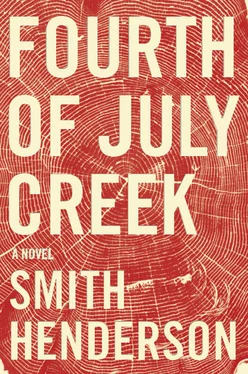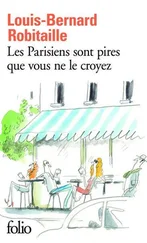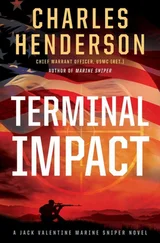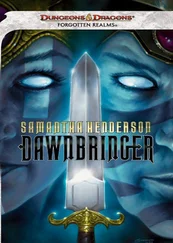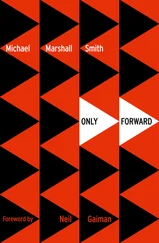He listened until they were gone. Then he gathered the clothes, folded them, put a business card in the pocket of the pants, and set them under a cleft in a rock where they would be dry and could still be seen. He walked carefully down through the dark woods to the road and to his car.
Another day at the office.
Pete drove west into Tenmile out of the absolute black behind him where there were no lights or residences in the Yaak Wilderness, where only a black horizon rose up unevenly to the constellations that pulsed from their cupola over the lightly spangled valley bowl below. Tenmile’s scarce illumination — neon bar signage, a few porch lights, the four streetlights flashing yellow — could not dim the stars in this plain and blank night country.
And though Pete was from another small town, or rather, a ranch outside of one, he liked it in Tenmile.
That is, he liked particular places in Tenmile.
He liked the Sunrise Cafe for its coffee and smoky ambience and the way his arms stuck to the cool plastic tablecloths in the summer and how the windows steamed, beaded, and ran with tears when everyone got out of church and came in for breakfast on a cold morning. He liked how Tenmile smelled of burnt leaves for most of October. He liked the bench in front of the tobacco shop on the square and how you could still send a child to buy you a pouch of Drum from inside with no problem from the proprietor. He liked the bowling alley that was sometimes, according to a private schedule kept only by them, absolutely packed with kids from the high school and the surrounding hills who got smashed on bottles of vodka or rotgut stashed under their seats and within their coats. How much a girl was always a girl and would turn bonkers when the correct boy took her coat, how she would bend over at the waist like she could not move her feet, as if she were rooted to the spot, desperate for him to come back and take something else so she could squeal again. How much that was like a pheasant flopping on the ground as it tried to lure you away from her hatchlings. How much biology throbbed and churned here — the mist coming off the swales on the east side of town and a moose or an elk emerging as though through smoke or like the creature was itself smoking. How the water looked and how it tasted right out of the tap, hard and ideal, like ice-cold stones and melted snow. How trout looked in that water, brown and wavering and glinting all the colors there were and maybe some that didn’t really exist on the color wheel, a color, say, that was moss and brown-spotted like peppercorns and a single terra-cotta-colored stone and a flash of sunlight all at once. That color existed in the water here.
There were also people here with secrets. A thief. A homosexual. People who mistreated their children, and whose houses stood out in Pete’s mental map of the town like amber beacons because he knew. Their secrets he kept.
The judge — a fat man named Dyson who recalled President Taft with his gray mustache, vest, coat, and pocket watch — knew Pete’s family back from Broadus (before Pete was born) and then Choteau where they now lived, and he introduced Pete to the town’s luminaries, the business owners, and the local color when Pete took the open position in the western half of Service District One. Pete met them all, the president of the Cattlemen’s Association, the union rep for Local 292, and a series of thin cowpoke noblemen who all shook his hand and said howdy when they saw him at the little Safeway or at the Sunrise. It might be years before they really felt they knew him, before they talked familiarly with him.
But the bars. In the bars was another class of people, fast friends who came in for a dollar burger and a fifty-cent beer and free peanuts for lunch, and sometimes blew off the rest of the day and just got wrecked. There was Ike who had a glass eye that would often as not be in somebody’s beer glass. Jerome and Betsy who fought, made up, fought, and let Pete crash on their couch if he wound up there for a nightcap. Demented Harold who always needed a ride home. The other Harold, a Blackfoot Indian they sometimes called “Indian Harold” who was always good for a round, no one knew where he got his money.
You went to the Fizz if you wanted to see Ike and his glass eye, and laze about at the low tables and plush chairs on rollers. You went to Freddie’s for burgers and beer, the long black griddle shimmering behind the bartender, and the War Bonnet for fishbowls of an unholy red concoction that was ice, liquor, and lurid grenadine. The Nickel was only just wider than a restroom stall and the bar ran the length of the place, and you peed out back into a cement trough that the gutter ran into. You drank elbow to elbow, and when a fight broke out, you couldn’t see it because of the narrowness of the chute you were in, and people climbed on the bar to get a look and the ceiling fan knocked off your hat. And at the Ten High time stopped and at some point you toppled over, and when you stood your back glinted with pull tabs and peanut shells and people sometimes cut their hands wiping you off. And, like tonight, it was dark when you were done with your work, and to get there you drove by the dimmed hardware store — the bags of lawn seed under the awning next to the lawn mowers padlocked to one another — the Dairy Queen, the firehouse, and onto the square proper, past the Ten High, then right on Main and into the dark alley behind it.
Tin gutters rattled in the wind and voices rebounded from the alleymouth, their figures already past when Pete looked up. He pulled on the back door of the bar and entered. In the hall, wainscoted with laminate tile, starkly lit by a bare bulb he flashed on a memory of himself from when he first moved to Tenmile, passing in and out of awareness, holding a Blackfoot woman fast by the waist, his head buried in her pure black hair. Where they ended up, what became of her, he couldn’t recall.
He pushed through the swinging doors to the bar proper. Old men chatted at a back table, a few more shot pool. A pair of the decrepit in their fine suits of polyester, brown and powder blue with matching vests and white piping, sat by watching from sunken eyes, sipping red beers on a row of stools along the wall. They leaned in to listen to what was said, pulling the toothpicks from their mouths as if that might help them hear.
Behind the bar Neil unloaded a box of beer into the cooler.
“Drink?” he asked, seeing Pete.
“Dyson been in?” he asked.
“Nawp.”
Pete went out the front door and looked across the street at the courthouse. The light in the judge’s office was out, but Judge Dyson and another man stood under a maple on the courthouse lawn talking politics in the light of the moon. The judge gestured animatedly. Dyson the old Democrat, fighting the good fight for the sinned-in-his-heart President Carter. Pete had read the race was close, but it wasn’t close here in Rimrock County. The people who lived up in the Yaak in their tar paper cabins and half-finished log homesteads weren’t political — they were perfect anarchists. Most of them lived here because the government was a negligible presence. They cut down their own trees for firewood. They hunted and fished whenever they wanted. Most trucks had a snowplow. Some even objected to the delivery of mail.
Dyson could generate a plurality of straight-ticket Democratic votes with state and federal employees and union guys, but he only prevailed on Election Day because the better part of the county actively avoided voting or mocked it, submitting Mickey Mouse as a write-in candidate.
But this year something was off. Hand-painted REAGAN COUNTRY signs had bloomed up in the pastures along the highway. Places that weren’t even hamlets, just little outposts of fierce individualism. The people the judge tried to cajole now didn’t care how long he’d been in the legislature, what committees he’d been on, or what pull he may or may not still have. They may have liked him personally, but not his pedigree.
Читать дальше
